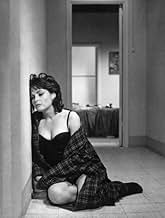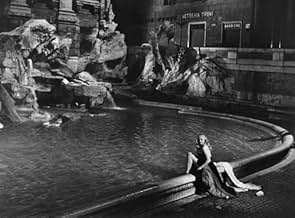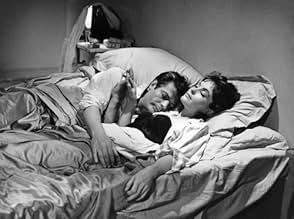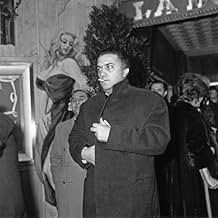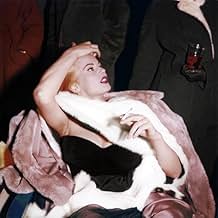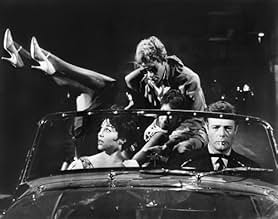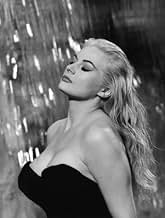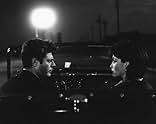Uma série de histórias que se seguem por uma semana, a vida de um jornalista que mora em Roma.Uma série de histórias que se seguem por uma semana, a vida de um jornalista que mora em Roma.Uma série de histórias que se seguem por uma semana, a vida de um jornalista que mora em Roma.
- Direção
- Roteiristas
- Artistas
- Ganhou 1 Oscar
- 11 vitórias e 12 indicações no total
Anouk Aimée
- Maddalena
- (as Anouk Aimee)
Magali Noël
- Fanny
- (as Magali Noel)
Resumo
Reviewers say 'La Dolce Vita' delves into themes of fame, decadence, and the superficiality of celebrity culture, using these characters to underscore the contrasts and contradictions within high society. The portrayal of it's characters enhances the film's satirical and critical perspective on the lifestyles and attitudes of the era, offering a nuanced commentary on the nature of fame and its impact on individuals and society.
Avaliações em destaque
I just saw a new print of this wonderful film after not having seen it for maybe 20 years and it is still spellbinding. Fellini sums up an era and an attitude here, and succeeds in doing something that ought to be impossible: he makes a full and meaningful film about empty and meaningless lives. Mastroianni seems to have been to Fellini what DeNiro has been to Scorsese--a perfect embodiment of a personal vision. What a wonderful actor he was--brilliant in his youth and in his age. Many other performers are hardly less fine here, and the cinematography and composition are stunning throughout. There are so many indelible images from this film, images that have become iconic over the decades: Ekberg in the Fontana di Trevi, the statue of Christ flying over Rome, the astonishing, candlelit procession at the castle, to name a few. It seems plot less and yet it isn't plot less at all; Marcello's ultimately fruitless search for meaning, a search that he abandons in the end, as he stares across a slight and yet unbridgable abyss on the beach at a lovely young girl who seems to possess the knowledge and understanding that is denied to him. I'm astonished at the number of people who don't get this movie, who seem to think that Fellini expects us to admire the bizarre characters who people the film, or who think that a movie about worthless individuals must be a worthless movie, or who don't seem to understand that movies that are full of what become clichés usually do so because they capture an important vision. Fellini made several exceptional films: 81/2, La Strada, Amarcord, and The Nights of Cabiria come to mind, but La Dolce Vita may be, when all is said and done, his masterwork.
I first saw this movie probably over 25 years ago when I was quite a bit younger. At that point I enjoyed it for its party scenes, sense of joy and life and vitality and....Marcello Mastroianni. Now that I'm older myself and have just recently seen the movie again, I find that I have a much deeper understanding of it. Maybe it takes some age to find some meaning. In a nutshell, Marcello is at a crossroads in his life, he's unable to settle down or move foreward into any direction - he's a diletante with aspirations but no real goals. He's wrapped up in himself and in projecting rather dreamy ideals onto other people. But as he keeps projecting on to others he comes to find in each situation that he doesn't really know the person and they are a mystery and probably a disappointment to him. certainly steiner is the biggest disappointment and disillusions him to a degree that he is apparently lost to a life of corruption and decadence as a result. but it's not that these people are difficult to understand to someone other than marcello - i think we can see that anita ekberg's character really is just a big good-natured blond and not the mysterious goddess marcello makes her out to be; his father is again - the typical traveling salesman and perhaps not the paternal figure that marcello would like him to be. his amour maddelena lives up to her name even as marcello starts believing himself in love with her - he's literally seduced by nothing more than an image he creates in his own mind. his friend steiner seems to have it all to marcello and to be the renaissance man that he would like to be - but, of course, he is dissatisfied and disturbed and we see what the end is. the only one whom marcello forms a somewhat realistic connection with is his girlfriend whom he treats badly and neglects despite her obvious love for him. he refuses to actually work on the one relationship that he could actually succeed at - he would rather dream about possibilities than actualize something.
marcello cannot communicate with others because he cannot see them as the people they really are - he just sees them as projections of his own needs, aspirations, desires and goals. when he finds out what they're really like, he either turns away or falls apart. this is an outstanding movie - 10 out of 10 and beautifully photographed. if you don't get it now, try again in 10 years - it will wait for you to catch up.
marcello cannot communicate with others because he cannot see them as the people they really are - he just sees them as projections of his own needs, aspirations, desires and goals. when he finds out what they're really like, he either turns away or falls apart. this is an outstanding movie - 10 out of 10 and beautifully photographed. if you don't get it now, try again in 10 years - it will wait for you to catch up.
Long, episodic film by Federico Fellini about the conceits and facades of life: fame, intellect, sex, friendship, despair, innocence, etc.
Marcello Mastroianni is perfect as the shallow tabloid reporter who joyfully follows around Rome a blonde movie star from Sweden (Anita Ekberg) as she prowls around the city's bars and bistros. He is also having an affair with a woman (Anouk Aimee) while his girl friend (Yvonne Furnaux) seems to be going nuts.
But as Marcello moves through the city following the movie star, the miracle of the virgin, a few parties, etc. we see that his life is very empty because the things he reports on are meaningless drivel. We see that fame and fortune and the trappings of success are meaningless.
Marcello starts to realize that the movie star is a vapid airhead, the miracles are a sham, and his friend's (who seemed quite happily married) ghastly murder and suicide show the futility of life itself.
The Fellini themes are common to many of his films, but what makes La Dolce Vita so memorable are the cynical tone, the Nina Rota music, and the string of terrific visual images.
The opening scene is of a helicopter hauling a gilded plaster statue through the air across Rome. The flying saint is a bizarre image but serves to set up the movies which is all about images and events that are never what they seem to be.
Notable are the scenes of statuesque Ekberg in that terrific strapless black dress with the voluminous skirts as she swishes around dancing and eventually wading through a city fountain. The party scenes are also notable. The first because of the intolerable intellectuals who sits around and talk and talk but never do anything. The last party has the indelible image of Mastroianni "riding" a drunken blonde woman as though she were a horse. The final image of the giant dead fish is quite unsettling as it symbolizes their bloated lives.
Fellini is brilliant in filling scenes with odd people as extras, usually hideously dressed or wearing ugly glasses. The "gallery" of people who inhabit the city is one of grotesques, vapid fashion slaves, the rich, hangers on, etc.
A long film, but highly recommended and very memorable.
Marcello Mastroianni is perfect as the shallow tabloid reporter who joyfully follows around Rome a blonde movie star from Sweden (Anita Ekberg) as she prowls around the city's bars and bistros. He is also having an affair with a woman (Anouk Aimee) while his girl friend (Yvonne Furnaux) seems to be going nuts.
But as Marcello moves through the city following the movie star, the miracle of the virgin, a few parties, etc. we see that his life is very empty because the things he reports on are meaningless drivel. We see that fame and fortune and the trappings of success are meaningless.
Marcello starts to realize that the movie star is a vapid airhead, the miracles are a sham, and his friend's (who seemed quite happily married) ghastly murder and suicide show the futility of life itself.
The Fellini themes are common to many of his films, but what makes La Dolce Vita so memorable are the cynical tone, the Nina Rota music, and the string of terrific visual images.
The opening scene is of a helicopter hauling a gilded plaster statue through the air across Rome. The flying saint is a bizarre image but serves to set up the movies which is all about images and events that are never what they seem to be.
Notable are the scenes of statuesque Ekberg in that terrific strapless black dress with the voluminous skirts as she swishes around dancing and eventually wading through a city fountain. The party scenes are also notable. The first because of the intolerable intellectuals who sits around and talk and talk but never do anything. The last party has the indelible image of Mastroianni "riding" a drunken blonde woman as though she were a horse. The final image of the giant dead fish is quite unsettling as it symbolizes their bloated lives.
Fellini is brilliant in filling scenes with odd people as extras, usually hideously dressed or wearing ugly glasses. The "gallery" of people who inhabit the city is one of grotesques, vapid fashion slaves, the rich, hangers on, etc.
A long film, but highly recommended and very memorable.
In many ways, this has to be regarded as the defining film of its era. It presaged a new style of cinema. It had a fluid, dreamy, symbolic visual and narrative form, and its resonance stems from its visual set pieces and overall ambience. It is also a fascinating exploration of the lifestyles and attitudes of an incipient, flash, indulgent and directionless generation.
The film is mainly remembered for the iconic scene of Anita Ekberg ebulliently splashing her way into the centre of the Trevi Fountain, followed by an adoring Marcello Mastroianni. The scene is emblematic of the film in the sense that it represents characters who wish to break free from the constraints of previous generations but their efforts, while perhaps on the surface appearing daring and romantic, often lead to nowhere. There's a sense of searching but not finding: breaking free of one set of constraints only in order to meet another. Marcello, the film's protagonist and perhaps a representation of the director himself, wants to be free of his wife and he doesn't want to sell himself to the capitalist system, but what else is there to provide meaning to his life? He is failing as an artist and his romantic conquests seem empty and unfulfilling. He yearns for a time when life was more clearly defined and yet he loathes the responsibility and entrapment that that definition would impose. And so he drifts from party to party, a little less energetic, a little more cynical on each occasion.
La Dolce Vita shows us the new hedonism and society's burgeoning obsession with celebrity. It is responsible for the word "paparazzi", which came from the name of one of the supporting characters, and it features a very young Nico, who would go on to achieve fame with one of the defining bands of the '60s. The film is a bold and brilliant exploration of life as it was lived by the upper-classes and the emerging chattering classes of the time. It's an enthralling experience which is both sweet and sombre.
The film is mainly remembered for the iconic scene of Anita Ekberg ebulliently splashing her way into the centre of the Trevi Fountain, followed by an adoring Marcello Mastroianni. The scene is emblematic of the film in the sense that it represents characters who wish to break free from the constraints of previous generations but their efforts, while perhaps on the surface appearing daring and romantic, often lead to nowhere. There's a sense of searching but not finding: breaking free of one set of constraints only in order to meet another. Marcello, the film's protagonist and perhaps a representation of the director himself, wants to be free of his wife and he doesn't want to sell himself to the capitalist system, but what else is there to provide meaning to his life? He is failing as an artist and his romantic conquests seem empty and unfulfilling. He yearns for a time when life was more clearly defined and yet he loathes the responsibility and entrapment that that definition would impose. And so he drifts from party to party, a little less energetic, a little more cynical on each occasion.
La Dolce Vita shows us the new hedonism and society's burgeoning obsession with celebrity. It is responsible for the word "paparazzi", which came from the name of one of the supporting characters, and it features a very young Nico, who would go on to achieve fame with one of the defining bands of the '60s. The film is a bold and brilliant exploration of life as it was lived by the upper-classes and the emerging chattering classes of the time. It's an enthralling experience which is both sweet and sombre.
There really isnt a plot. This is about a tabloid photographer and some scenarios he gets into. All the characters seem vain, selfish and wanting more from life without actually knowing what they want. The Rome nightlife is brought to life here and there are many scenes at lavish parties where all the characters dont appear to have any emotional connection to one another. There are also disconnected Catholic themes throughout the movie. It leaves you questioning your own life and emptiness.
Você sabia?
- CuriosidadesThe famous scene in the Trevi Fountain was shot over a week in March, when nights were still cold. According to Federico Fellini (in an interview with Costanzo Costantini), Anita Ekberg stood in the cold water in her dress for hours with no trouble. Marcello Mastroianni, on the other hand, had to wear a wetsuit beneath his clothes, and even that wasn't enough. Still freezing, he downed an entire bottle of vodka, so he was completely drunk while shooting the scene.
- Erros de gravaçãoWhen Marcello and Maddalena arrive at the prostitute's apartment, a long electric cable (light?) can be seen attached to the right rear of the car, moving along until the car stops.
- Versões alternativasIn the original American release, distributed by American International Pictures, the titles open with the AIP logo and appear over a shot of the sky with clouds. In the current release on DVD - and as shown on TCM - the title sequence is over a black background. When originally released, censors in several countries trimmed certain scenes, including the orgy near the end of the film.
- ConexõesEdited into La case du siècle: Cinecittà, de Mussolini à la Dolce Vita (2021)
Principais escolhas
Faça login para avaliar e ver a lista de recomendações personalizadas
- How long is La Dolce Vita?Fornecido pela Alexa
- What is the English translation of the title "La dolce vita"?
Detalhes
- Data de lançamento
- Países de origem
- Central de atendimento oficial
- Idiomas
- Também conhecido como
- La dulce vida
- Locações de filme
- Villa Giustiniani-Odescalchi, Bassano Romano, Viterbo, Lazio, Itália(abandoned castle scenes)
- Empresas de produção
- Consulte mais créditos da empresa na IMDbPro
Bilheteria
- Faturamento bruto mundial
- US$ 217.420
- Tempo de duração2 horas 54 minutos
- Cor
- Proporção
- 2.35 : 1
Contribua para esta página
Sugerir uma alteração ou adicionar conteúdo ausente


![Assistir a Trailer [English SUB]](https://m.media-amazon.com/images/M/MV5BNjE3MTU3OTItN2I0NS00YzU2LWE1ZTctZDQ3Y2I1NDc4MGMxXkEyXkFqcGdeQXRyYW5zY29kZS13b3JrZmxvdw@@._V1_QL75_UX500_CR0)
![La Dolce Vita: [2-Disc Collectors Edition]](https://m.media-amazon.com/images/M/MV5BZTY2ZTg3YmEtZDZkMS00MmFkLThhMjItMWVmN2NlNmJhZGZjXkEyXkFqcGdeQXVyNzU1NzE3NTg@._V1_QL75_UX500_CR0)

